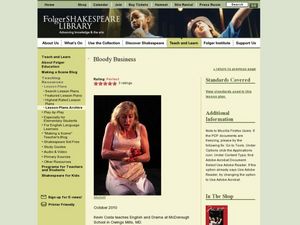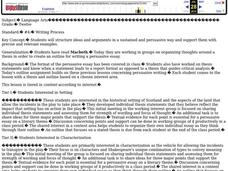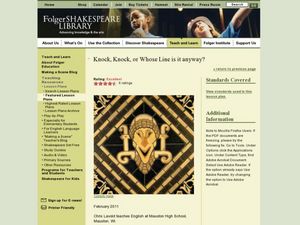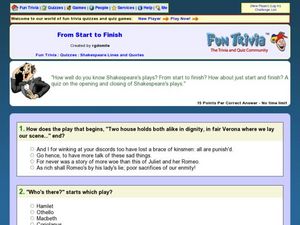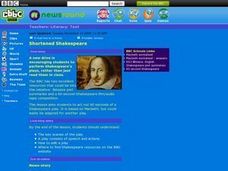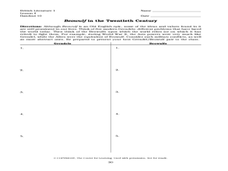Literacy Design Collaborative
Whom Do We Trust, and Why?
Is it possible to regain trust? Scholars put much thought into the subject of trust after reading Shakespeare's Macbeth. Readers work together to analyze how the character relationships develop the a message about trust. They then create...
Curated OER
Bloody Business
Students research word frequencies in Macbeth and create a frozen picture inspired by a word. In this Macbeth lesson, students view Blood Will Have Blood and discuss the dual meaning of the word "blood." Students identify five major...
Curated OER
Macbethan Art
Students review and reproduce an article of Elizabethan styled clothing as a part of an analysis of Shakespeare's Macbeth. In this Elizabethan art activity, students discuss the fashion of the Elizabethan era and research it online....
Curated OER
Writing Process
Students read Macbeth and work in groups to organize and create an outline for a persuasive essay. In this persuasive essay lesson, students work in tiered learning groups to organize their thoughts for a persuasive thesis about the...
Curated OER
"What are these...?"
High schoolers discuss the "witches" of Shakespeare. In this literature analysis instructional activity, students research the influence of Macbeth's sisters on his behavior. They examine various terms used to describe the sisters, and...
Curated OER
Character Tea Party
A tea party in Wonderland? An East Egg brunch with Gatsby, Daisy, Tom, and Nick? Breakfast with Miss Havisham, Lady Macbeth, and Abigail Williams? Or dinner with Andre, Hamlet, and Randle Patrick McMurphy? Class members select a favorite...
Curated OER
Macbeth
Students engage in a variety of activities in order to complete a unit about the Shakespeare work of Macbeth. The lessons are part of a layered curriculum. The objective is to create a portfolio to create more layers.
Curated OER
Hamlet Research Paper: Find, Evaluate, and Select Appropriate Research Sources
Help young researchers find credible sources online. Modeling with a Google search for information about Shakespeare’s Macbeth, use a computer projector or Smart Board to show class members how weak the top three search results are....
Curated OER
Knock, Knock
Students explore the use of sound as a special effect to enhance or radically change the meaning of a scene. They design a soundscape for Macbeth's porter scene, and conclude by listening to and watching two different film treatments of...
Curated OER
Who's There: Acting in the Dark
Students participate in a performance of Macbeth using the lighting techniques that were employed during the Shakespearean era. Working in groups, student reenact a scene. Afterward they discuss the challenges of working with limited...
Curated OER
Macbeth Presentations
Young scholars make Powerpoint presentations or Web pages about Macbeth. Their presentations must include at least three elements from a provided list. They write reflective papers about their learning experience.
Curated OER
Six Degrees of Lord of the Rings
Here's a fascinating take on a three-year honors, AP language, and AP literature course. Designed for teachers, the presentation suggests how to connect Tolkien's classic to the AP English canon. Very thought-provoking and definitely...
Curated OER
Julius Caesar: iambic pentameter
Read in iambic pentameter! Read Julius Caesar and Macbeth to study the famous meter. While the lesson points out the specific passages to use, you'll have to find them and copy them yourself.
Curated OER
And. . . Freeze!
Learners read a short section of a scene very closely and develop a tableaux as a start to the performance process. They write a paragraph in the voice of a character. They present their beginning, middle and end tableaux to the class.
Curated OER
This Was the Noblest Roman of Them All
High schoolers analyze the problems with staging and character using the play Julius Caesar. They summarize the final scene of the play and view film versions of the scene. Additionally, they prepare a promptbook for the final scene and...
Curated OER
Knock, Knock, or Whose Line is it Anyway?
Students compare two versions of Macbeth and participate in improvisational acting. In this improvisational lesson, students read and discuss the text before watching two different versions of the film. Students roleplay a scenario and...
Curated OER
Looking at Life through the Creation of Personal Metaphors
Young scholars focus on the creation of personal metaphors, which are first illustrated in pictures and caricatures and then extended to descriptive/analytical paragraphs. They teach the lesson to others using their own personal...
Curated OER
From Start to Finish: Shakespeare's Plays
This online interactive quiz is too low-quality to assign to your class; however, you may want to adapt the idea of recognizing starts and finishes of works for your own lesson or quiz. An example from the worksheet is: "When shall we...
Curated OER
Faulkner's The Sound and the Fury: Benjy's Sense of Time and Narrative Voice
Students analyze narrative voice in William Faulkner's The Sound and the Fury. In this novel analysis lesson, students analyze Faulkner's writing style and the narrative voice of Benjy. Students create a reading journal for the lesson...
Reading Shakespeare
Shakespeare Literature Circles Role Sheets
Tired of those blank stares after your class reads a particularly complex passage from a Shakespearean play? Help high schoolers untangle that prose with a literature circle activity. Ten different roles prompt class members to focus on...
Curated OER
Lesson 1: Theatre Arts
Learners create and perform based on cuttings from various plays and literature to demonstrate the learning of the process of improvisation. Students connect improvisation with theatre and real life. Learners participate in a class...
Curated OER
Shortened Shakespeare
Young scholars discover the two main ingredients of a play: speech and actions. They then listen to a shortened version of "Macbeth" and write down one sentence to describe what is happening in each of the comic-strip cells.
Curated OER
An Actor's View of Shakespeare
Students research characters from different plays. In this Shakespeare and performing arts lesson, students discuss the portrayal of characters from the perspective of real actors. Students work in groups to examine the technique for...
Curated OER
The Concept of the Hero
Students explore the symbolic implications for the concept of the hero with a focus on the Beowulf theme. In this hero concept lesson, students find specific examples of monsters from Beowulf to complete the chart. Students list the...



